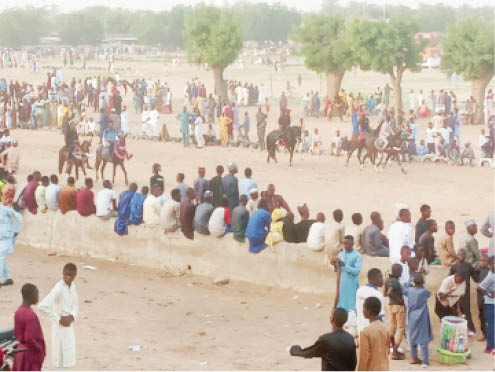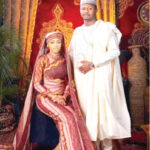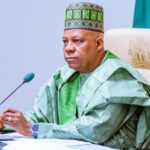Residents in Kano State went in search of activities that will replace the age-long traditional durbar festivities being observed annually, Daily Trust reports.
The state this year celebrated the Eid Adha without the usual pop and pageantry that normally comes with it, especially the much-anticipated durbar staged in all the five former emirates.
Kano State House of Assembly recently repealed the Kano Emirates Council law and sacked all emirs which paved the way for the reinstatement of Muhammadu Sanusi II as the sole first-class emir in the state.
The development has given birth to a disagreement between the dethroned 15th Emir of Kano, Aminu Ado Bayero, and the state government which resulted in a number of legal suits before the courts.
- NIGERIA DAILY: How To Make Sense Of The Court Ruling On Kano Emirship Tussle
- Kano Emirate: Court leaves contenders in limbo
As a result, the state police command announced a ban on durbar, all public gatherings and protests within the state.
However, the state governor, Abba Kabir Yusuf, disagreed with the order and accused the police of issuing instructions in the state without consulting him.
While the reinstated emir, Muhammadu Sanusi II, held what could be termed a mini durbar by riding on his horse back home from Eid prayer on Sunday, all other durbars were subsequently cancelled.
In other emirates, the residents were left with seeking an alternative to celebrate the occasion as their emirs were sacked.
In Kano especially, residents did not find the development appealing as they looked elsewhere to please themselves.
Daily Trust correspondent reports that some youths have chosen to still go ahead with the celebration by devising other ways to engage themselves. Many of them gathered in groups at the race course ground riding horses and entertaining their spectators.
In other parts of the city, crowds converged for days every evening to engage in various activities to ward off the disappointment arising from the non-holding of the durbar.
Similarly, the Kwankwasiyya Sallah celebration usually held by supporters of the NNPP leader Rabiu Musa Kwankwaso at his residence on Tuesday received a massive turnout due to the non-holding of the durbar and other traditional events in the city.
In another part, the 15th Emir of Kano, Aminu Ado Bayero, joined his supporters to celebrate Sallah at the Nassarawa mini palace on Tuesday.
Seasoned musicians and artistes were also in attendance to cheer up the teeming supporters for hours.
For others, the Kano Zoological Garden is another destination to soothe themselves.
Young men and women, children and couples, prefer this place because of its serene environment alongside the wild animals found there.
Residents in Gaya, Rano, Karate, Bichi lament the situation
Daily Trust also reports that activities were at low key in Rano, Gaya, Karaye and Bichi emirates recently abolished by the Abba Kabir Yusuf-led administration. It was gathered that the residents observed the festive period without any form of celebration.
Residents spoken to said typically, the festive period is marked by ceremonies, community gatherings, and bustling markets, but this year, the streets were noticeably quiet.
In Rano, some residents said they were not happy with the situation caused by the abolishing of the emirate.
Alhaji Yusuf Abdullahi, a resident, explained that this year’s Eid celebrations were quite different and disappointing.
“This Eid feels different; it’s like a part of our identity has been taken away. Our emirate’s traditions and festivities brought us together, and now there’s a void.”
“The dissolution has not only affected the communal spirit but also the economic activities tied to the celebrations. Marketplaces that once buzzed with life are now facing a lull, with vendors and traders worried about their livelihoods.
“Local businesses, which usually experience a surge in sales during Sallah, are also feeling the pinch. The dissolution has led to uncertainty and a cautious approach among customers,’’ he said.
“Normally, we would have sold out of goods by now. People are hesitant to spend, and the usual festive rush is missing,” lamented Haruna Musa, a shop owner in Rano.
“Eid el-Kabir was always a time of prosperity for us. This year, we are barely getting by,” noted Mallam Ibrahim Danasabe Yalwa.
In the Bichi Emirate, the mood is similarly sombre. One of the youth leaders, Usman Idris, while sharing his concerns said, “Our emirate had a unique way of celebrating that united everyone. Now, without our council, there’s a sense of loss and confusion.”
He added that the impact of the emirate dissolution is far-reaching, affecting not just the celebratory customs but also the social and economic fabric of Bichi Emirate.
In Gaya, the story is much the same. Residents are grappling with the changes and the resultant impact on their Eid celebrations.
Aminu Adamu, a local trader, expressing his disappointment lamented that, “Our traditions have been disrupted. The dissolution has left us in a state of uncertainty. We don’t know what to expect anymore.”
Similarly, in Karaye, the festive spirit has been dampened. Some residents have expressed dissatisfaction with the current situation of dissolution of the five emirates in the state by the House of Assembly.
Nura Bello Karaye, a community leader, explained that, “This year’s Eid lacks the joy and communal spirit we are used to. The administrative changes have left us feeling fragmented and uncertain about our future.”

 Join Daily Trust WhatsApp Community For Quick Access To News and Happenings Around You.
Join Daily Trust WhatsApp Community For Quick Access To News and Happenings Around You.


